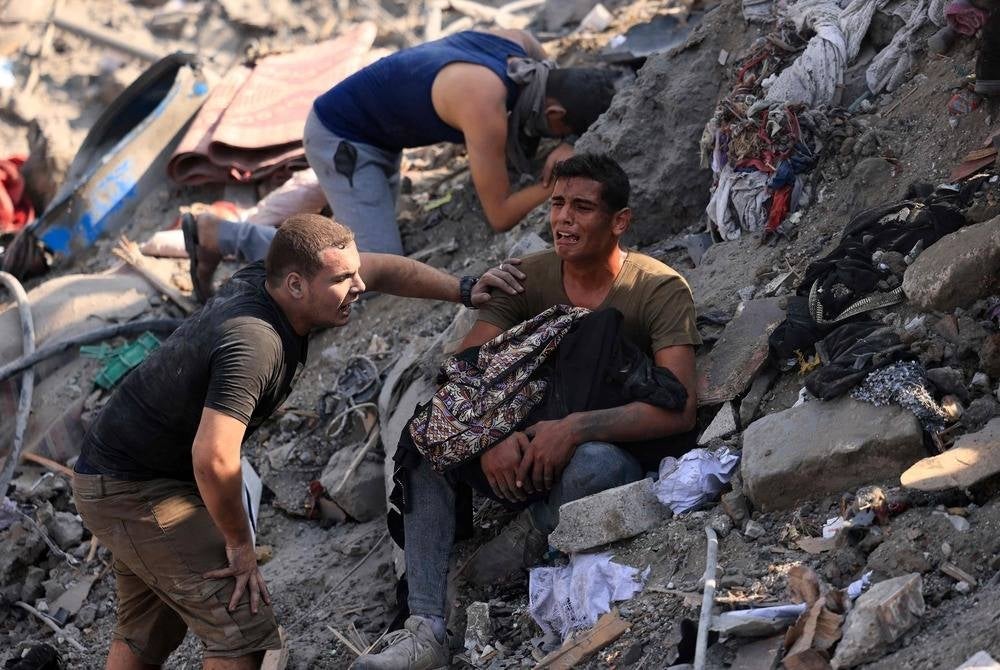Gazans feel alone amid Israel's relentless attacks - Palestinian volunteer

KUALA LUMPUR - People in Gaza feel they are alone amid relentless Israeli attacks on the blockaded enclave, says Palestinian volunteer Dr Tareq M. Altalmas, urging for definite measures to end the ‘genocide’.
The Global Peace Mission Malaysia (GPM) coordinator at its humanitarian centre in Gaza City stressed that the international community should focus on halting the Israeli killing machine through their diplomatic efforts.
"Unfortunately there has been no real action in this regard," he told Bernama when contacted via WhatsApp on Thursday.
Tareq expressed how heartbreaking it was to see shrouds (kafan) among the items in the humanitarian aid trucks that recently entered Gaza through the Rafah crossing.
"It is heartbreaking to send kafan, (it's like) they are waiting for us to die and the thing we mostly need is kafan," he said adding that the 20 trucks that carried humanitarian supplies to Gaza were not enough to cater for the whole population.
"This means that each person in Gaza would get 0.0000084 food box. In the normal days, 500 trucks entered Gaza, and now we are already 23 days with nothing," he said.
Tareq and his team are focusing on supplying basic needs such as food, water, and hygiene kits to the injured and displaced people in Gaza City, the al-Nusairat refugee camp in the middle of the Gaza Strip, and Khan Yunis in southern Gaza.
Apart from medical supplies, Tareq emphasised that fuel is also an urgent necessity at the moment as it will run the only power plant in Gaza. This, in turn, will assist hospitals in their operation, enable bakeries to produce bread, and allow water filtering centres to generate drinking water.
He pointed out that an Indonesian hospital has switched off its main electricity generator and is now relying on a smaller generator. This means only a small part of the hospital is operational due to the lack of fuel.
He added surgical operations are being carried out in the corridors of hospitals without the minimum requirements such as sterilisation or anesthetics.
"In the morning I need to go out to fill drinking water for my family, but today (Thursday) unfortunately I could not as the fuel from the centre finished so it could not produce the water.
"A lot of things are needed actually, we as a humanitarian organisation are not able to find the food in the markets to supply to the displaced people in the schools," he said.
Tareq also highlighted the need to allow more injured people to enter Egypt for better treatment, as only a handful were granted entry to the country recently.
"They allowed 80 injured people at the beginning and 10 of them returned to Gaza because they didn't have their passports. Some of the 10 have already died due to their injuries.
"People have been brought out to hospitals from their bombed houses, so mostly, the passports are under the rubble. We have tens of thousands of injured, with a collapsed medical sector," he said.
Tareq said Israeli airstrikes on Jabalia refugee camp on Wednesday worsened the situation as the camp is a temporary residential area for most of the forcibly displaced Gazans since its establishment in 1648.
He said after the massacre, people have not been going anywhere as there is no safe place in Gaza now, adding that the Israeli ground operation has divided Gaza into south and north, preventing people from moving between the two parts.
He stated that 9,061 Palestinians have been killed in Israeli attacks since Oct 7, with over 32,000 injured and more than 2,060 still missing, most of whom are believed to be buried under the rubble.
Government data also indicates that over 1.5 million Palestinians have been displaced, and over 200,000 residential units destroyed, along with 212 schools, 52 mosques and three churches, he said. - BERNAMA










